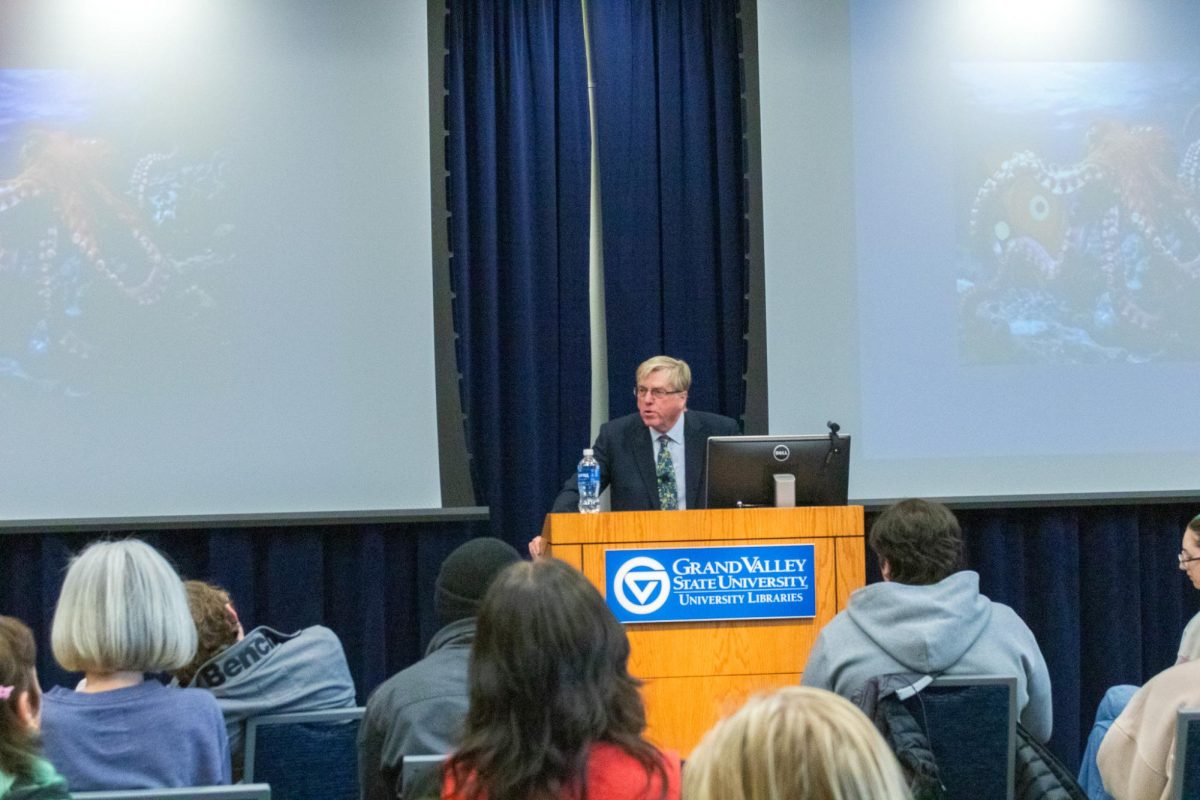Author, Meijer CEO holds book release at GVSU
GVL / Dylan McIntyre. Hank Meijer and Gleaves Whitney speaking together at the Loosemore Auditorium about the Hauenstein Center for Presidential Studies on Thursday, Nov. 2, 2017.
Nov 6, 2017
Arthur Vandenberg was a Republican senator from Grand Rapids who worked through differences in views to help create the United Nations, the North Atlantic Treaty Organization (NATO) and other important pieces of foreign policy legislation. To offer more perspective on this, Hank Meijer, co-chairman and CEO of Meijer, wrote a biography about the life and career of Vandenberg. Meijer was recently at Grand Valley State University to speak about the book.
The book release took place Thursday, Nov. 2, at the DeVos Center Loosemore Auditorium. The room was packed with more than 200 attendees who had gathered to hear Meijer’s rendition of Vandenberg’s life. Meijer started from the beginning of Vandenberg’s life and walked the crowd through his important achievements.
The GVSU Hauenstein Center for Presidential Studies’ Common Ground Initiative partnered with the Gerald R. Ford Presidential Foundation, Library and Museum to host the book release. Scott St. Louis, the program manager for the Common Ground Initiative, said a lot can be learned from Vandenberg.
“It’s an important thing, looking to the past for role models willing to work across lines for the common good,” St. Louis said. “Vandenberg is influential, and there’s always new things to learn with how infinitely broad history is.”
Meijer quoted Vandenberg, saying, “This is not our war” in regard to World War II. Vandenberg was an isolationist who did not want to intervene in a war he thought Americans should stay out of. Vandenberg even tried to fight then President Franklin D. Roosevelt on sending arms to help the U.S.’ future allies. However, after the attack on Pearl Harbor in 1941, this changed rapidly. Vandenberg understood that he must believe in the greater goal of the U.S., Meijer said.
According to Meijer, Vandenberg was a potential dark horse candidate for the Republican presidential candidacy in 1940. This fell through, but Meijer said it still shows the immense trust and respect Vandenberg’s colleagues had for him.
Years later, Vandenberg was appointed the voice on foreign policy before Roosevelt died. From there, he had to set aside some of his predilections for the betterment of the country. Vandenberg went on to participate in the creation of the Marshall Plan, United Nations and NATO.
St. Louis said Vandenberg had to change his views to best represent the U.S. and that Vandenberg worked with Democrats to help bring different prominent programs into place.
The Common Ground Initiative is designed to welcome leading scholars to discuss political challenges we face, according to St. Louis. The initiative hosts a multitude of public programs, panels and conferences that promote learning from good debate. St. Louis believes it is easy to learn about your own views but hard to learn the views of others, and he thinks Vandenberg was able to do this so that he could lead the way for new policies to take place.






















